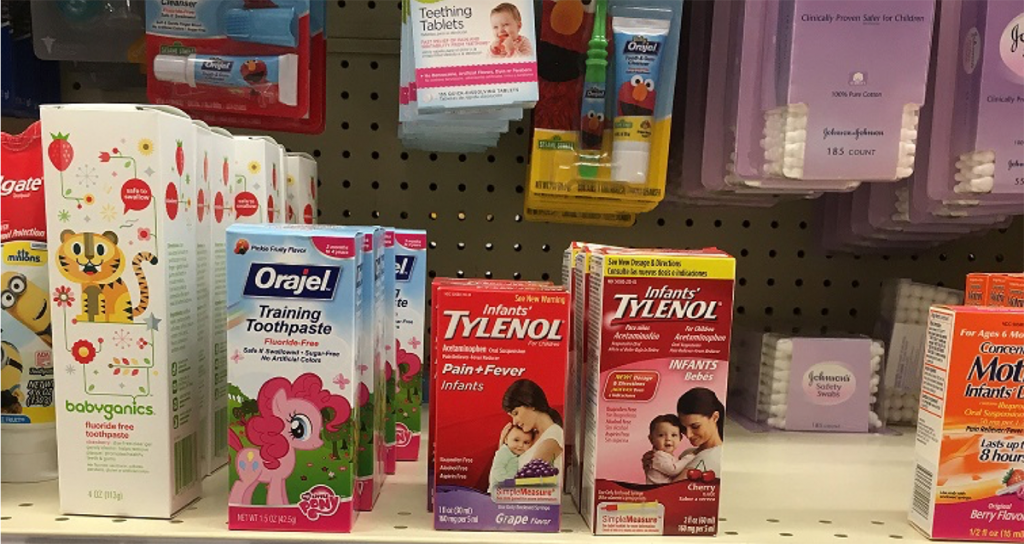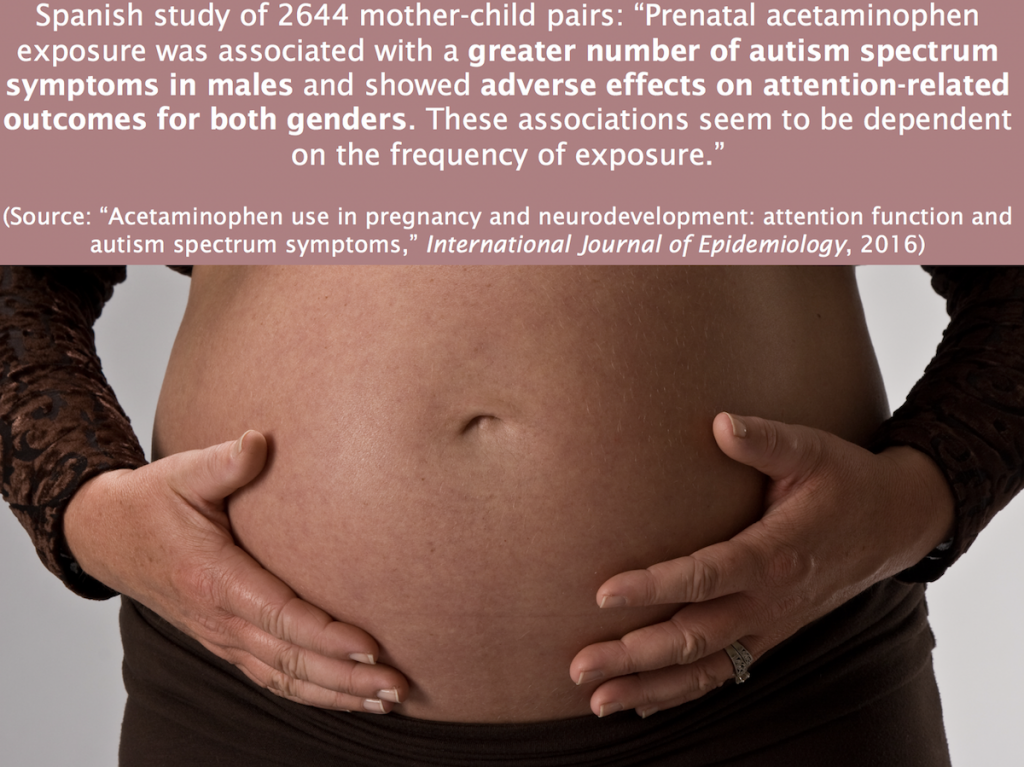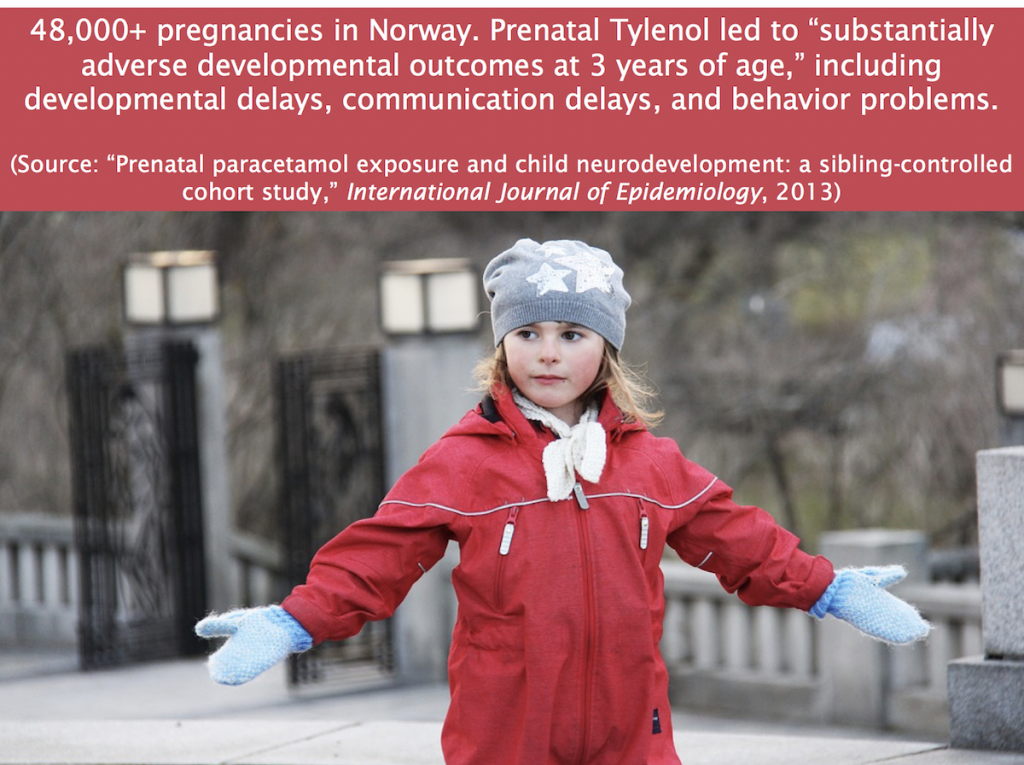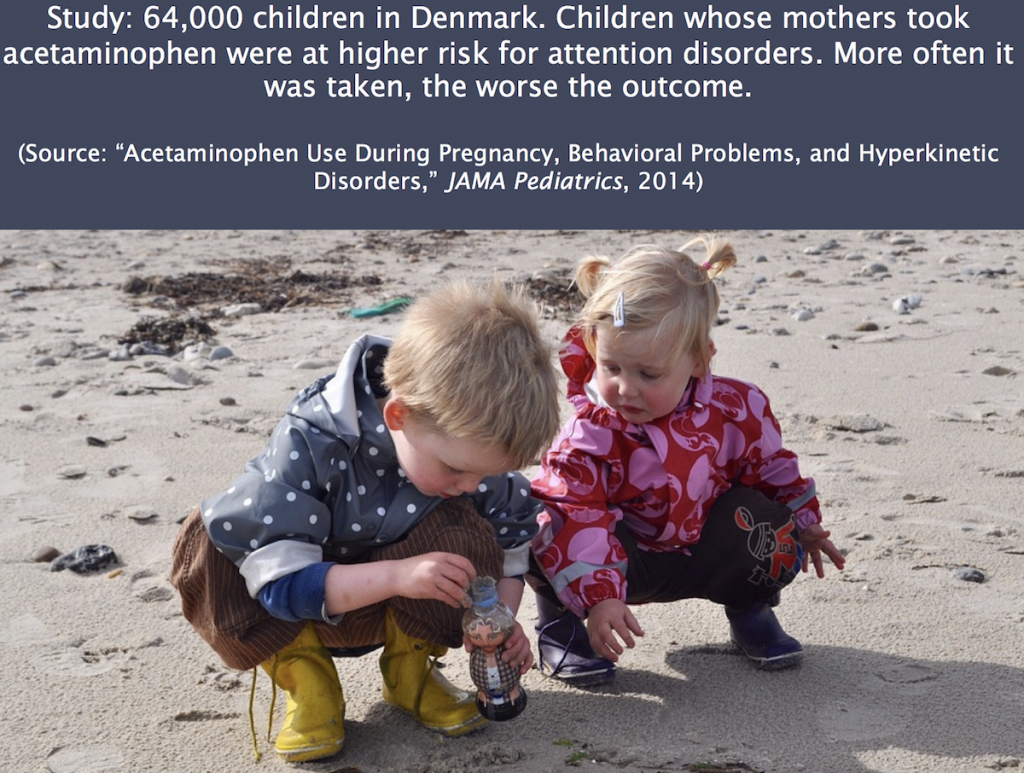Editor’s note: What could Tylenol and SIDS possibly have in common? The American Academy of Pediatrics implies that SIDS is the parents’ fault, caused by co-sleeping or lying an infant on his stomach. But Nicole Chrysler, a physician’s assistant based in Hawaii, argues the primary cause of SIDS is Tylenol.
By Nicole Chrysler
Special to JenniferMargulis.net
I found out I was pregnant with my second child in 2007 and was excited to discover I was having a boy! After having my daughter in 2005, I knew a son would complete our family. I couldn’t wait for his arrival. I was a medical professional: I had been a family practice physician assistant for five years and tried to learn as much as I could about how to raise a healthy child.
Coincidently, while I was pregnant, three infants in Kootenai County, Idaho (where I lived at the time) died from SIDS.
They were all between the ages of four months and six months old. One little boy was named Vance Walker.
If only one baby had died from SIDS I may have overlooked it, but when three boys died in a short amount of time I became frightened.
Would my baby boy be next?
Why boys?
Why the same ages?
Why did they stay alive for the first four months without any problems then suddenly die?
One picture in the obituary section of the Coeur d’Alene Press newspaper hit me hard:
A gorgeous, chubby, healthy, smiling 4-month-old boy who suddenly died in his sleep with no prior health issues.
As I read about these baby boys in the Idaho newspapers, I found myself thinking, what kind of cruel mystery illness takes such a perfect baby?
My pursuit for the safety of my unborn son led me to call the mothers of these three SIDS babies.
These were the hardest phone calls I’ve ever made.
All three boys had some things in common before their deaths.
All three mothers told me their baby boys were healthy and had no prior medical issues.
All three had recently been vaccinated though the time between death and the vaccines was up to 3 weeks after vaccination. To me, that didn’t seem to correlate.
All three had changed from breast milk to formula (within a month or so) and all three had been taking Tylenol repeatedly before they died.

Could Tylenol and SIDS be related?
At the time, I began to research the liver and how it processes Tylenol and I started to understand how dangerous this drug is.
Maybe there was a cause for these “Sudden Infant Deaths.”
Maybe it wasn’t their mattresses or the position they were sleeping in or whether or not there was a fan in their room. (These are listed as “causes” of SIDS but they all struck me as unconvincing reasons for infants to die.) We teach mothers how to avoid SIDS by telling them not to co-sleep and to lie an infant on his back. But when I was growing up my parents were told to place infants on their stomachs to avoid SIDS. And in Japan, where the SIDS rates are lower than in America, nearly every family co-sleeps.
Besides, one of the moms told me her baby was not on his belly, he was on his back when he died. Also, all babies start to flip over on their own eventually. This is a natural sleep habit.
So, I continued my search for an answer.
The things I learned about Tylenol and SIDS
I learned that it is easy for the liver to get overload with acetaminophen, the main ingredient in Tylenol. Just a double dose of the drug can cause liver overload.
I also learned that liver overload causes the body to create a poison, called NAPQI, which can cause encephalopathy.
A high dose or repeated dose exposure to NAPQI can even cause death.
I also learned that excessive or repeated Tylenol use can also cause high ammonia levels and methemoglobinemia, a dangerous blood condition categorized by elevated levels of methemoglobin.
One of the three babies who died of SIDS was found frothing blood from his eyes and mouth. These are symptoms of methemoglobinemia.
This is the same process that happens to a cat if you give them Tylenol. Cats cannot process Tylenol and will froth blood from their eyes and mouth the same way.
Even after my son was born, I kept reading and researching. I now believe these SIDS babies were inadvertently poisoned by Tylenol. I spoke to a coroner in Idaho at the time and testing for methemoglobinemia was not part of an autopsy.
This is, sadly, a true story.
I have spent the last 12 years contacting universities and researchers and anybody who has any further information on the dangers of Tylenol.
I asked a student at Gonzaga University to research Tylenol in rats for me.
I made a short film discussing Tylenol and autism. You can watch it here:
I have told family and friends and all of my patients to avoid giving infants and children acetaminophen and to watch their dosing of Tylenol even as adults.
This drug, Tylenol, is by no means safe.
Tylenol should not be available over the counter. It definitely should not be available for infants or children.
I am saddened that our Food and Drug Administration continues to allow acetaminophen to be sold over-the-counter without any thorough research on its acute, chronic, repetitive use, and long-term side effects.
I have seen patients die from Tylenol overdose.
Other people use Tylenol to commit suicide.
A Tylenol overdose is painful and terrible and way too easy to accidentally do.
Educating people about the dangers of this drug has become my life’s passion.
My son is 12 years old now.
When I first learned about Tylenol and SIDS, I thought that Tylenol would be pulled from the market by now. I thought people would turn to other, safer remedies.
Instead, infants, children, and adults continue to die or suffer permanent liver damage from this drug.
The researchers who know this truth need help to spread this valuable information.
Warn anyone you know who is pregnant or has a newborn to stay away from Tylenol.
You may be saving a life.

About Nicole Chrysler, PA-C: Nicole Chrysler, PA-C, has been a family medicine physician assistant for over 17 years. She created a video discussing the relationship between Tylenol and autism called “Tylenol: Autism in a Bottle.”



Articles related to Tylenol and SIDS and other health problems:
One Family’s Story
Tylenol and Pregnancy
Tylenol: Better, Safer Alternatives
Published: November 21, 2019
Last update: May 20, 2020
I find this very interesting about Tylenol and children. It Seams so possible also easy to avoid . I don’t remember having or using in my generation ? Thanks for information
So happy I came across this. My baby boy is getting ready for surgery and I had asked if Tylenol was necessary as we don’t use. Will be asking more questions. Thank you
Yes, babies over the age of 6 months can take infants ibuprophen instead which is a safer choice. Again stay low with your dosing.
SIDS used to only be in the first two months. I’ll Topsey found that 2/3 of them were because of a subluxed upper neck joint from the birth process. After the baby got motor control they were able to control their neck and although they would be adults with neck pain and migraines, the joint was safer. Anything after two months is not actually the original SIDS the way it was a generation ago
That’s good info. Thank you!
So if a baby has a fever and is 3 months, what would be safe to give him?
Thanks for asking, Brooke. Here is a detailed article to answer that question: http://www.jennifermargulis.net/tylenol-alternatives-better-safer-remedies/
Well if the fever isnt too high. Take clothes off, cold bath, cool compresses first. Then evaluate from there. If there’s no other choice then dose low and spread doses far apart. The infants ibuprophen dosing is based on the infants weight so depending on how heavy they are they may be able to take it.
I lost my baby girl 18 years ago this Christmas. Within a week prior to her passing she received her shots at the doctors office. She had a tiny cold and I gave her one does of infant Tylenol, that night she passed away. I don’t think one does of Tylenol would have caused SIDS. But I do think a combination of things are to blame and that’s why it hasn’t been figured out yet.
Thank you for sharing this, Jamie. I’m so sorry for your loss. It’s devastating.
Oh Jamie. I am so very sorry you’ve had to miss her!!
I gave my son about 5 doses of tylenol after his lip tie was revised. It was one month ago. He was 7 weeks of age. Do you think he has lasting damage from this?
Only time will tell but it depends on how much was given, the timing between doses and his livers ability to process. There are many factors that’s why it has been difficult to pin down.
I also believe there is a strong correlation between Tylenol and SIDS. My son was given Tylenol after his circumcision and that night he had an ALTE. I found him cold unresponsive and not breathing in his swing. Luckily, after a couple of minutes of starting cpr he began to breathe.
How scary I’m glad he’s ok. Thank you for sharing your story!
In my pediatric practice Integrative Pediatrics, in Portland Oregon, we routinely encourage parents to get rid of all acetaminophen (tylenol) from their home. This drug blocks your ability to get rid of toxins and I 100% agree with the ideas shared in this article.
Infants should never be given tylenol. I won’t take it – EVER!
Dr. Paul
Thank you for sharing!
What is something you can give them other than Tylenol, if you need to give them something because they are in pain or running a high fever?
Having lost a son to sids I think this article is wrong. Sids is unexplained. If your child died of Tylenol overdose that would be the cause of death. Same as co sleeping is usually suffocation. Sids babies can not be revived and there is no explanation. I agree that Tylenol is bad but it doesn’t cause sids
I sympathize with you experience, but disagree with your statement. Encephalopathy is commonly stated as the cause of death in many SIDS cases, but as mentioned in this article, and as told by many parents in the SIDS awareness communities, autopsies are not done in a full detail as they should be. After reading autopsy reports posted by grieving families of infants lost to SIDS, a common trend is for the reports to seek a diagnosable cause, again like Encephalopathy (or brain swelling), and declare that to be the cause of death, when in actuality that’s a symptom. They don’t test for drugs in the system, or for other important factors, and it’s even been documented that some pathologists lie about their findings to substantiate that vaccines and prescription drugs were not involved. I cannot imagine the pain of losing a child to SIDS, as my losses have all been due to miscarriage, but I urge you to dig deeper into the substantial connections between vaccines, medications, SIDS, and other childhood illnesses.
But what about the relation to getting shots as Well? Could they have been a factor? Very weird how all if them just had received shots as well.
I’d love to discuss this with you. I’ve been researching the endocrine disrupting, neurological, and glutathione depleting effects of tylenol since covid19 made its appearance. Please reach out to me.
Penny Wittbrodt
Retired young RN.
Penny